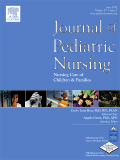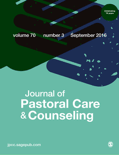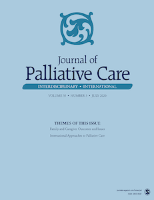
Journal of Social Work in End-of-Life & Palliative Care
Scope & Guideline
Navigating the Intersection of Care and Compassion
Introduction
Aims and Scopes
- Interdisciplinary Collaboration:
The journal emphasizes the importance of interdisciplinary approaches in palliative care, highlighting the role of social workers in collaboration with healthcare teams to address the multifaceted needs of patients. - Psychosocial Support:
A core focus is on the psychosocial aspects of care, including emotional, social, and spiritual support for patients and their families facing end-of-life challenges. - Cultural Competence:
The journal addresses the need for culturally responsive practices in palliative care, recognizing the diverse backgrounds of patients and the importance of tailoring interventions to meet their unique needs. - Research and Evidence-Based Practice:
It promotes research that informs evidence-based practices in social work, aiming to improve interventions and outcomes for patients receiving palliative and end-of-life care. - Innovation in Care Delivery:
The journal explores innovative models and practices in delivering palliative care, including the integration of technology and new methodologies in social work.
Trending and Emerging
- Trauma-Informed Care:
There is an increasing emphasis on trauma-informed care practices within palliative settings, recognizing the impact of trauma on patients and families and the need for sensitive approaches. - Virtual Care Innovations:
The journal has seen a rise in articles discussing the use of virtual care models, particularly in response to the COVID-19 pandemic, highlighting the importance of accessibility in palliative care. - Social Justice and Equity:
Emerging discussions around social justice issues in palliative care reflect a commitment to addressing disparities in access and treatment for marginalized populations. - Patient and Family-Centered Care:
An increasing focus on patient and family-centered approaches in palliative care is evident, emphasizing the importance of shared decision-making and individualized care plans. - Impact of COVID-19 on Palliative Care:
The ongoing effects of the COVID-19 pandemic on palliative care practices and the experiences of patients and caregivers have become a significant theme in recent publications.
Declining or Waning
- Traditional Models of Care:
There appears to be a decreasing emphasis on traditional models of end-of-life care, as newer, more integrated approaches gain traction in practice and research. - Generalized Bereavement Support:
The focus on generalized bereavement support is declining, with a shift towards more targeted and specific interventions that address the unique needs of diverse populations. - Longitudinal Studies:
There has been a noticeable decrease in the publication of longitudinal studies examining the long-term impacts of palliative care interventions on patients and families. - Focus on Solely Medical Aspects:
The journal has moved away from content that emphasizes only the medical aspects of end-of-life care, reflecting a broader understanding of the role of social work in addressing psychosocial needs. - Single-Country Studies:
There is a waning interest in studies focused exclusively on single-country experiences, with a growing trend towards international and comparative research.
Similar Journals

APPLIED NURSING RESEARCH
Advancing Clinical Practice with High-Impact Nursing ResearchApplied Nursing Research is a premier journal dedicated to the dissemination of high-quality research within the nursing field, published by W B Saunders Co-Elsevier Inc. With an impact factor that places it in the Q1 category for Nursing (miscellaneous), this journal ranks 23rd out of 139 in its Scopus category, firmly establishing itself in the top percentile (83rd). Since its inception in 1988, Applied Nursing Research has provided a vital platform for sharing innovative findings that impact clinical practice and healthcare delivery. The journal serves as an essential resource for researchers, professionals, and students aiming to enhance their knowledge and application of nursing practices. While it does not offer open access, it remains a crucial publication for those seeking to explore contemporary nursing topics and research trends through a rigorous academic lens.

BMC Palliative Care
Innovating Palliative Care Through Open Access InsightsBMC Palliative Care is a leading open-access journal dedicated to advancing the science and practice of palliative care, embodying a commitment to share impactful research and best practices since its inception in 2002. Published by BMC, a well-respected publisher in the field of medicine, this journal showcases original research articles, clinical studies, and systematic reviews that address the multidisciplinary nature of palliative care. With an impressive Q1 ranking in the Medicine (miscellaneous) category and a Scopus rank of #113 out of 636 in General Medicine, it serves as a vital resource for researchers, clinicians, and students engaged in improving patient care and quality of life. The journal's open-access model ensures that valuable insights and knowledge are accessible to a global audience, fostering collaboration and innovation in the field. Located in the heart of the UK, it continues to play a crucial role in the evolving landscape of palliative medicine through its dedication to rigorous research and scholarship.

Canadian Geriatrics Journal
Fostering collaboration in the field of gerontology.Canadian Geriatrics Journal, published by MULTIMED INC, is a prominent platform dedicated to advancing the field of geriatrics and gerontology. With its esteemed status as a Q2 journal in both Geriatrics and Gerontology categories for 2023, it ranks favorably within the academic community, holding a 73rd percentile in Nursing Gerontology and a 59th percentile in Medicine Geriatrics and Gerontology according to Scopus metrics. Since its inception in 2011, the journal has aimed to foster innovation and disseminate pivotal research that addresses the complexities of aging populations. Researchers, healthcare professionals, and students interested in the intricacies of geriatric care will find a wealth of open-access resources that contribute significantly to enhancing practice and care methodologies in Canada and beyond. With its address located at 66 Martin St, Toronto, ON L9T 2R2, Canada, the journal stands as a vital resource for stakeholders in the geriatric field.

Science of Diabetes Self-Management and Care
Fostering Excellence in Diabetes Self-Management SolutionsScience of Diabetes Self-Management and Care is an esteemed journal published by SAGE Publications Inc, dedicated to advancing research and knowledge in the fields of endocrinology, diabetes management, and health professions. Established in 2021, this peer-reviewed, open-access journal aims to provide a platform for the dissemination of innovative and practical strategies for diabetes self-management and care, meeting the needs of an increasingly diverse patient population. With an impressive impact factor reflective of its quality and relevance, the journal has achieved notable rankings—Q2 in Endocrinology, Diabetes and Metabolism, and Q1 in Health Professions and Social Sciences, underscoring its significance in both clinical practice and healthcare research. Researchers, healthcare professionals, and students will find valuable insights and breakthroughs in diabetes care, making this journal an essential resource for those seeking to contribute to the future of diabetes self-management."

JOURNAL OF PSYCHOSOCIAL ONCOLOGY
Exploring the intersection of psychology and oncology.JOURNAL OF PSYCHOSOCIAL ONCOLOGY, published by Routledge Journals, Taylor & Francis Ltd, serves as a pivotal platform in the interdisciplinary field of psychosocial oncology, providing critical insights into the psychological, social, and emotional aspects impacting cancer patients and their families. With a storied history dating back to 1983 and converging until 2024, this journal holds a prestigious positioning, ranked in the Q2 category for Applied Psychology and Q3 for both Oncology and Psychiatry & Mental Health in 2023, highlighting its integral role in these overlapping fields. Despite not currently offering an open access model, the journal continues to attract a broad spectrum of scholars with its impactful research, evidenced by its Scopus rankings within the 50th to 58th percentile across related categories. Researchers, clinicians, and students alike will find the journal’s focus on the psychosocial dimensions of cancer to be invaluable, as it advances knowledge and practice aimed at improving patient outcomes and well-being in the cancer care continuum.

Journal of Pediatric Nursing-Nursing Care of Children & Families
Elevating nursing care with impactful research and advocacy.The Journal of Pediatric Nursing - Nursing Care of Children & Families, published by Elsevier Science Inc, is a leading academic journal that focuses on the essential practices and advancements in pediatric nursing. With an ISSN of 0882-5963, this prestigious journal has been at the forefront of pediatric healthcare literature since its inception in 1986, offering critical insights and research findings that address the needs of children and families. Recognized in 2023 with a Q1 ranking in Pediatrics and ranked 6th out of 25 in the Scopus Nursing and Pediatrics category, it reflects its significance and impact in these fields. The journal prioritizes high-quality research that enhances nursing care practices, advocates for child and family-centered approaches, and promotes evidence-based guidelines. While the journal currently does not have an open access model, it remains a vital resource for researchers, practitioners, and students dedicated to improving pediatric health outcomes. With a commitment to scholarly excellence, the Journal of Pediatric Nursing continues to contribute to the evolving landscape of nursing care for children globally.

Research and Practice in Intellectual and Developmental Disabilities
Enhancing lives with evidence-based practices.Research and Practice in Intellectual and Developmental Disabilities is an esteemed journal published by Routledge Journals, Taylor & Francis Ltd, dedicated to advancing knowledge and practices in the fields of intellectual and developmental disabilities. Since its inception in 2014, this journal has played a pivotal role in disseminating high-quality research and innovative practices through a rigorous peer-review process, aimed at enhancing the lives of individuals with disabilities. With an ISSN of 2329-7018 and an E-ISSN of 2329-7026, this journal focuses on a spectrum of interdisciplinary approaches, including the latest in developmental neuroscience and clinical neurology. Despite its Q4 and Q3 rankings in related categories such as Developmental Neuroscience and Neurology, respectively, it continues to attract contributions from a diverse array of scholars, providing vital insights and evidence-based practices. While remaining firmly committed to academic integrity and quality, the journal serves as a critical platform for researchers, professionals, and students alike, who are keen to address contemporary challenges and foster effective interventions within the realm of intellectual and developmental disabilities.

Journal of Pastoral Care & Counseling
Inspiring Multidisciplinary Collaboration for Holistic CareJournal of Pastoral Care & Counseling, published by SAGE Publications Inc, serves as a pivotal platform for scholarly discourse within the realms of pastoral care, counseling, and religious studies. With a distinguished Q1 ranking in Religious Studies for 2023 and a notable Scopus ranking of #37 out of 644 in the field of Arts and Humanities, this journal has established itself as a leading source for innovative research and practical insights. Although it operates on a traditional subscription model, the journal ensures a wide dissemination of its content, enriching the academic landscape since its inception in 2002. The journal seeks to foster multidisciplinary collaboration and elevate the standards of practice within pastoral care and counseling, making it essential reading for researchers, professionals, and students keen on exploring the intersection of spirituality and mental health.

JOURNAL OF PALLIATIVE CARE
Championing the Art and Science of Palliative CareJOURNAL OF PALLIATIVE CARE is a premier publication in the field dedicated to advancing the understanding and practice of palliative care. Published by SAGE Publications Inc, this journal serves as a vital platform for researchers, healthcare professionals, and students who are at the forefront of improving patient quality of life across various medical contexts. Since its inception, the journal has provided a rich repository of interdisciplinary research and insightful articles, addressing essential topics such as pain management, end-of-life care, and psychological support. With a respectable impact factor and a Q3 quartile ranking in the miscellaneous medicine category, it reflects the growing importance of palliative care in contemporary healthcare. The journal covers pivotal research from 1985 to 2015 and 2017 to 2024, underscoring its commitment to fostering a well-rounded discourse within the medical community. Researchers seeking to contribute to the field will find this journal an invaluable resource for disseminating cutting-edge findings and practical applications.

INTENSIVE CARE MEDICINE
Elevating Standards in Intensive Care ResearchINTENSIVE CARE MEDICINE is a premier academic journal in the field of critical care and intensive care medicine, published by SPRINGER. With an impressive HIndex and a remarkable impact factor, this journal consistently ranks in the top quartile of its category, achieving Q1 status for 2023. Spanning over four decades since its inception in 1977, it serves as a crucial platform for disseminating groundbreaking research and clinical advancements that shape the future of intensive care. Notably, it holds a distinguished position in the Scopus rankings, placed #1 out of 110 in its field, reflecting its importance and influence among researchers and clinicians alike. Although it is not an open-access journal, it offers various subscription options, ensuring wide accessibility to its high-quality content. The journal is dedicated to enhancing knowledge and practices within the critical care community, making it an indispensable resource for practitioners, researchers, and students pursuing excellence in intensive care medicine.